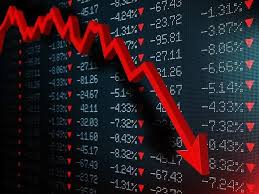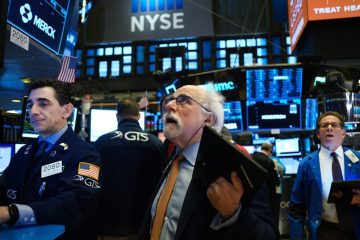Markets tumble as scale of stimulus programs numbs investors

Global equities tumbled further on Wednesday, with bond and gold prices also sliding in an unusual tandem, as markets grappled with the scale of government programs aimed at softening the economic shockwave from the coronavirus.
The Trump administration asked Congress to approve $ 500 billion in cash payments to taxpayers in two rounds starting April 6 and $ 50 billion in secured loans to U.S. airlines to address the outbreak’s impact, according to a document seen by Reuters.
Traders struggled to sort out various moves by governments and global central banks to shore up economies bracing for what looks likely to be a short but deep global recession from a still growing pandemic.
The rout pushed the S&P 500 below its level of the December 2018, a key psychological low point that many investors hoped would not be breached. The benchmark U.S. stocks index has fallen 29.2% in 20 sessions.
Wall Street pared some losses to close about 5% and gold fell 3.6% at one point as investors dumped precious metals and other safe-havens for cash after the additional U.S. stimulus measures unveiled Tuesday failed to calm markets.
Heavy demand for U.S. Treasury securities and the difficulty of the market to function as a vehicle for price discovery was creating dislocations, said Marvin Loh, senior global macro strategist at State Street.
“The ability in the Treasury market to transact the type of volume that they normally do is very pressed,” Loh said.
“The more and more intense and volatile this environment gets, for me, the harder it is to see it function until we get a little bit of calm,” he said.
Rapidly rising yields for Treasuries and German bunds, the benchmark for euro zone lending, have made cash the only risk-free asset, said Ulrich Leuchtmann, head of FX and commodity research at Commerzbank in Frankfurt.
“This is not just a financial markets crisis; it is a real economic crisis and therefore the fact that this demands extremely high fiscal responses makes even those usual safe- havens more difficult to hold,” Leuchtmann said.
Estimates for the duration of the damage extend into the summer. Japan already is in a recession, a downturn is imminent in Europe and a U.S. recession will start in the second quarter, a report from IHS Markit said.
The U.S. economy could shrink 4% this quarter and 14% next quarter, and for the year is likely to shrink 1.5%, a JP Morgan economist said, one of the most dire forecasts yet issued for the potential hit from the epidemic.
The coronavirus has raised the prospect of the steepest ever annual fall in oil demand, Goldman Sachs said. U.S. crude futures plummeted to an 18-year low and Brent hit more than 16-year low as travel and social lockdowns slammed demand.
Certain correlations are breaking down in the markets as typical safe-haven assets sell off, said Yousef Abbasi, global market strategist at INTL FCStone Financial Inc in New York.
“During a dramatic risk-off situation you would expect to see at least a little bit of a bid in bonds or maybe in gold, but we’re seeing the opposite,” Abbasi said.
“Despite the continued pain in equities, the safe-haven asset correlation seems to be now trading with risk assets, rather than the inverse to them,” he said.
A repricing of in the Treasury market added to anxiety about spread of the coronavirus, while the plunge in oil prices did not help, said Nela Richardson, investment strategist at Edward Jones.
“The trigger was really the global fiscal response to the pandemic. In the long term its good news but the short term response in Treasuries is how are we going to pay for it?”
Bond prices tumbled, instead of rising, as investors sold to raise cash. Yields on the benchmark 10-year U.S. Treasury US10YT=RR yield rose to 1.2080%, after hitting 1.266%.
In Europe, the gap between German and other euro zone bond yields widened, with investors demanding higher premiums to hold anything but German debt.
Ten-year French government bonds yielded 69 basis points more than their German counterparts, the most since April 2017.The gap between 10-year German and Dutch debt grew as wide as 37basis points, the most since July 2015.
U.S. gold futures GCcv1 settled 3.1% lower at $ 1,477.90 an ounce.
“Gold continues to suffer from risk-off panics in the market, trading back below $ 1,500 level,” said Tai Wong, head of base and precious metals derivatives trading at BMO.
“Liquidity here, as in most markets, is deeply compromised and we expect to see continuing volatility, mood-driven swings,” Wong said.
MSCI’s gauge of stocks across the globe .MIWD00000PUS shed 5.06% and emerging market stocks lost 4.70%. The pan-European STOXX 600 index lost 3.92%.
On Wall Street, the Dow Jones Industrial Average .DJI fell 1,338.46 points, or 6.3%, to 19,898.92. The S&P 500 .SPX lost 131.09 points, or 5.18%, to 2,398.1 and the Nasdaq Composite .IXIC dropped 344.94 points, or 4.7%, to 6,989.84.
Boeing Co (BA.N) fell another -18.6% as the planemaker called for a $ 60 billion bailout for U.S. aerospace manufacturers facing the fallout of an extended collapse in global travel.
European bourses tumbled, with indexes in London .FTSE, Frankfurt .GDAXI and Paris .FCHI plunged from 4% to 5%.
In Asia, the MSCI’s broadest index of Asia-Pacific shares outside Japan .MIAPJ0000PUS dropped 4% to lows last seen in summer 2016, led by a 6.4% fall in Australia. Japan’s Nikkei .N225 dipped 1.7%.
The economic slowdown will be tough on travel-related industries, gaming and brick-and-mortar retail, said Scott Crowe, chief investment strategist at real estate-focused CenterSquare Investment Management in Philadelphia.
U.S. clothing retailer Gap Inc (GPS.N) and luxury department store operator Neiman Marcus will close their stores for two weeks, joining other retailers in a widespread effort to stem the spread of the coronavirus.
“It’s a little less obvious whether the government will start bailing out retailers. The problem is that a lot of these retailers were already teetering on a knife edge coming into this,” Crowe said. “There are very few industries right now that can sustain to a four- to eight-week shutdown.”
U.S. crude hit its lowest since March 2002, falling even after weekly government data that otherwise could have been supportive to prices. The draw on gasoline stockpiles and smaller-than-expected build in crude inventories showed that people were preparing ahead of business and school closings, analysts said.
U.S. crude CLcv1 fell $ 6.58 to settle at $ 20.37 a barrel as a 56% slide over the past 10 days marked the worst stretch over a similar period of time since the futures contract was launched in 1983.

